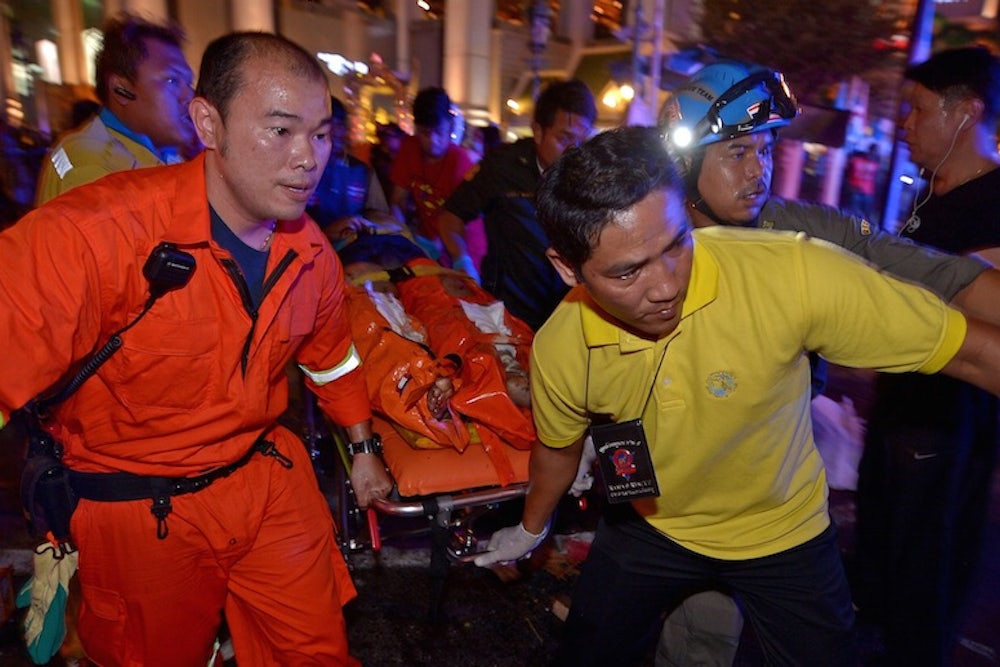BANGKOK — Last Monday, my aunt called me at around 7 p.m. A careful and soft-spoken woman, her voice was filled with worry: “Turn on the TV. Huge explosion at Rajprasong. Might be a bomb.” As she spoke, I heard a wail of sirens stream downtown on the expressway near my house, followed by more wails, and more, and more.
A six-pound pipe bomb had exploded in the heart of Bangkok, killing at least 20 and injuring more than a hundred. The bomb had been placed on a bench inside a small Hindu sanctuary dedicated to Lord Brahma—a quiet square within a bustling district, Rajprasong, of high rises and glitzy malls. This was our Boston Marathon bombing, but on a larger scale; everyone in the city was either personally affected by the bomb, or knew someone who was. One friend was on the Skytrain that ran above Rajprasong when the bomb exploded. Another, who was at a mall a hundred yards away, wrote on Facebook, “Have never felt or heard something so loud before."
Given all this, I expected some determined soul-searching from my country. I anticipated shock, grief, and most of all, the focused pursuit of justice. But instead of allowing for a genuine recovery, the Thai government has done everything in its power to convince the public that there's nothing to see here, everything is fine, let's all move on. Meanwhile, it has bungled almost every imaginable aspect of the criminal investigation.
It began hours after the explosion, when the military government, which came to power in a coup last year, started the blame game. The junta chief, Prayuth Chan-Ocha, pointed fingers at a faction of the Red Shirts, an anti-government group in the Northeast provinces, only to be forced to recant moments later. Police officers then blamed Uighur groups for the bomb, only to be overruled by their commanders, who insisted that this wasn’t an act of international terrorism. No one knew anything, but the authorities—desperate to project competency and progress in their investigation—pretended they did. As these leaders declared one speculation after another, the Thai public expounded on these conjectures with rumors of their own, and the public discourse over Thailand’s biggest terror attack devolved into a nationally sanctioned Telephone Game.
At the bomb site, the government’s haste manifested itself physically. After allowing forensic teams a few short hours to collect evidence, government workers descended on the shrine the very next morning to scrub the site. A day later, the shrine reopened. The job was so rushed that on Wednesday, when the public was welcomed back into the shrine, human remains fell from a tree. On Thursday, a BBC reporter found shrapnel and ball bearings that were missed by Thailand’s forensic teams and handed it over to authorities, only to be rebuffed by the embarrassed police chief: “I am not sure if that reporter has adequate knowledge about explosives. Police have spent enough time collecting the evidence.” So far, no suspect has been located or caught.
The government’s hurry was likely driven by a desire to reassure tourists, who contribute almost a fifth of Thai GDP, that the country is still safe. The Ministry of Foreign Affairs reiterated guarantee after guarantee in their statements:
“You will be safe during your stay in Thailand and you will also experience friendliness, smiles and kindness that we always provide."
"The government wants all of you have confidence that you will be safe during your stay in Thailand."
“The government wants to assure everyone the situation is under control."
During my visit to the shrine on Monday, a week after the blast, I found only a few hints that something horrible had happened there—a torn-apart electrical conduit, broken glass on the second story facade of the Grand Hyatt hotel. Otherwise, it was business as usual. An old woman with graying hair stood at the shrine’s entrance, selling garlands. The smell of sandalwood incense filled the air. Dancers honoring Lord Brahma circled under a green roof, while drums and hardwood xylophones played in the background. I asked the security guard whether he was there during the bombing. He sighed, as if he'd been asked a hundred times before: “I was not present at the incident.” And, of course, the people themselves have returned: the usual hordes of tourists and well wishers, lighting incense at stations and rotating around the golden statue of Lord Brahma. Thailand, it seems, remains one of the safest tourist destinations in Southeast Asia.
But this cannot be the extent of our recovery. The Thai people deserve not just safety, but justice and true progress. For too long we have been trained to numb ourselves to the indignity of our broken justice system, and while some might see that as resilience, I see it as a stain on our national conscience. Every time we hurry to move on, we forget the past for the convenience of the future—abandoning the fallen, their families and our collective experience. Last week's bombing should have forced us to confront an ugly reality, not caused us to deny the pursuit of truth from the outset.
